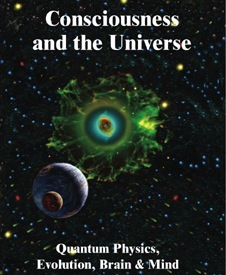|
|
|||||||||||||||
Journal of Cosmology, 2010, Vol 7, 1788-1789. JournalofCosmology.com, May, 2010 Famed astrophysicist Dr. Stephen Hawking has voiced concern about the dangers, he believes, are posed by alien predators who may arrive in giant space ships, to conquer, enslave, destroy, colonize, and voraciously exploit the resources of Earth. According to Hawking:
10. Who’s Afraid of Hawking’s Aliens? Arpita Roy, Ph.D.1, James D. Wells, Ph.D.2,3, 1Department of Anthropology, University of California, Berkeley Berkeley, CA USA, 2CERN, Theory Group 385 Route de Meyrin CH-1211 Geneva 23, Switzerland, 3 Department of Physics, University of Michigan, Ann Arbor Ann Arbor, MI USA A dog discovers another dog at a garbage dump. The first dog bares its teeth. This stimulates the other dog to respond by a growl. The most interesting aspects of this encounter are the signs and the stimulus given off, the absence of any verbal communication, and the sizing-up prowl of the animals. The mere sighting of the “other” is not inherently dangerous, but the subsequent engagement can be if one views it in his best interest to fight for whatever reason. Hawking’s comment on the dangers of seeking out aliens (Hawking, 2010) provokes us to think not so much on whether aliens exist or not but on our capacity to imagine what they could be like if they were to exist, the scenarios of possible interaction, and the pragmatics of contact. Engagement with the extraterrestrial has three stages: discovery, monitoring, and contact. Discovery can be safe -- we passively look for signals of alien activity from afar. There is no reason not to do that. We would be imprudent even not to. America spies on Canada, to name just one other hyper-careful act. On the other hand, it is not prudent to send out probes into the cosmos with a plaque bearing our return address as was the case with the Pioneer 10 and 11 space crafts, launched in 1972 and 1973. Monitoring leads to risks as we may wish to utilize interventionist technologies to find out more, or simply approach to study the phenomenon at close range, thus provoking a reaction. Here extreme caution should be displayed, and contingencies envisioning all possible consequences should be formulated. Contact is even more risky, with the prospect of malevolent beings colonizing and plundering us, or even benevolent or dispassionate beings unwittingly spreading diseases or agents that would destroy us. Hawking mentions the aftermath of Columbus' discovery, but it was not guns and superior technology which destroyed the Aztec civilization, but the microbes, viruses, and disease which the would be conquerers carried with them. If aliens exist, it is inevitable that someday there will be contact. We are fully engaged in the discovery phase now, and our curiosity will inevitably lead us to contact, if they exist. They might give us insight into the origin of life and our place in the universe. Is there a purpose to life, or is it all a cruel cosmic joke? Christians might ask: "Did Christ die on the cross for them?" Others might ask: "Do they believe in god"? Humans look to the heavens for answers, and we might assume that what might bind us to aliens of other worlds is our desire to know more. Hawking tells us that our curiosity may kill the cat, that looking to space for others of our kind may lead to the extinction of the human race. But this search for answers is also what makes us. We must know, even if it spells our doom, just as the male Black Widow spider must mate even though it spells his doom. Be it radio and TV signals beamed into space, gold anodized plaques with our return address attached, or the many government and non-government programs designed to search the heavens for signs of life, if there is intelligent alien life, then someday contact will happen. Despite Hawking’s warnings, the search continues. Contemplation of alien life has moved up from popular films to peer reviewed journals, “one of the sacred pillars of the scientific edifice” (Goodstein, 2000). Experimental studies and computer simulations suggest (Xie et al., 2010) that the cosmos is brimming with life-friendly Earth-like planets in the near cosmos. NASA and other space agencies have an ambitious program for the discovery of living planets under the name PlanetQuest (NASA, 2010). These include the current Kepler Mission, which has already launched and achieved data (Borucki et al., 2010), and the future Terrestrial Planet Finder mission, which is slated for launch in the near future. We are making serious scientific efforts to discover if aliens exist, what they may be like, and on what planets might they live. Perhaps we should pay heed to the findings detailed in a Brookings Report written nearly a half a century ago (Michael, 1961): "anthropological files contain many examples of societies, sure of their place in the universe, which have disintegrated when they had to associate with previously unfamiliar societies espousing different ideas and different life ways; others that survived such an experience usually did so by paying the price of changes in values and attitudes and behavior." History has taught us there may be a price for the search for knowledge. And the anthropological record is replete with deadly encounters which led to the demise of those who were not prepared or equal to the challenge, such as the Neanderthals’ encounter with modern humans 30,000 years ago. However, we see no reason why we should be more afraid or less afraid this time than in the past. In the space between paranoia and speculation, lie the clues we can pursue by diligent anthropological, astrophysical, and biological detective work, which may enable us to conceive and to prepare for the inevitable contact with intelligent aliens. In the process of this search for answers we may discover our own self just as an infant seeing its own image in the mirror marks the first step in the child’s identification of its "self" (Lacan, 1968). It has been said that we are defined by what we are, and what we are not. Otherness, what is alien, can also be a mirror that leads to self-discovery. Unresolved questions of our own origin and development may be fruitfully explored while working on shadowy aliens. The trope of alterity that the alien offers is a bona fide muse (Mack, 1994). Albee’s masterpiece "Who's Afraid of Virginia Woolf?" is a story replete with symbolism which speaks to the illusions which bind human relationships, but which are destroyed by the discovery of a son’s existence. The "discovery" leaves them devastated – the original believers and nonbelievers alike. So too might the discovery of alien life devastate believers and non-believers alike. This is a price that throughout history, humans have been willing to pay, and it is this search which defines us and distinguishes us, as human. Stephen Hawking says, “To my mathematical brain, the numbers alone make thinking about aliens perfectly rational” (Hawking, 2010). Even if aliens are nonexistent or there is no hope of contact, may the illusion continue – it serves us well.
Borucki, W.J. et al. (2010). Kepler Planet-Detection Mission: Introduction and First Results. Science, 327:977-980 (February 19th). Goodstein, D. (2000). How Science Works. In: Reference Manual on Scientific Evidence, 2nd edn, Washington, DC: Federal Judicial Center, pp. 67-82. Hawking, S. (2010) As quoted in “Abstract: Stephen Hawking’s Aliens”, Journal of Cosmology, Vol 7 (May). Lacan, J. (1968). The Mirror-Phase as Formative of the Function of the 1. Trans. Jean Roussel. New Left Review, 51, 73-83. Mack, J.E. (1994). Abduction: Human Encounters with Aliens. New York: Maxwell Mamillan International. Michael, D.N., ed. (1961). Proposed Studies on the Implications of Peaceful Space Activities for Human Affairs. Brookings Institution to the 87th U.S. Congress, report No. 242. Washington, D.C.: National Aeronautics and Space Administration. NASA (2010). PlanetQuest: Exoplanet Exploration. http://planetquest.jpl.nasa.gov/ (Accessed 29 April 2010). Xie, J.-W, Zhou, J.-L., Ge, J. (2010). Planetesimal Accretion in Binary Systems: Could Planets Form Around Alpha Centauri B? Astrophys J, 708, 1566.
|
|
|
|
|
|
|
|
 Colonizing the Red Planet ISBN: 9780982955239 |
 Sir Roger Penrose & Stuart Hameroff ISBN: 9780982955208 |
 The Origins of LIfe ISBN: 9780982955215 |
 Came From Other Planets ISBN: 9780974975597 |
 Panspermia, Life ISBN: 9780982955222 |
 Explaining the Origins of Life ISBN 9780982955291 |












